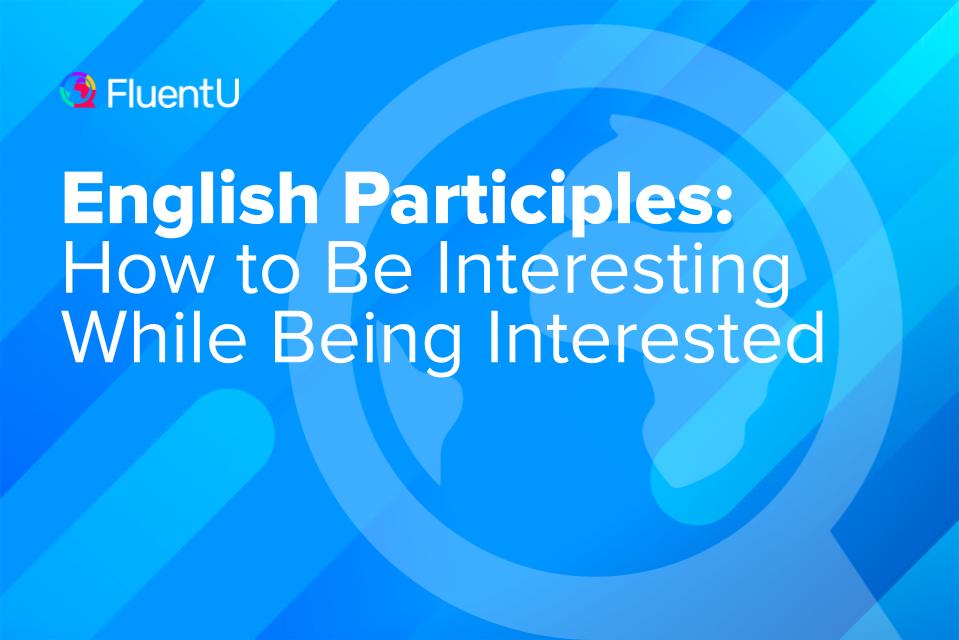English Participles: How to Be Interesting While Being Interested

Participles are crucial (very important) in English because of the different functions they have.
As you will see in this post, the same word can be a verb, an adjective or a phrase depending on how they are functioning in the sentence.
But let’s not get ahead of ourselves! Let’s start from the beginning.
Download: This blog post is available as a convenient and portable PDF that you can take anywhere. Click here to get a copy. (Download)
What Are English Participles?
So what exactly are participles and why are they important in English?
The Merriam-Webster dictionary defines participles as words that have the characteristics of both a verb and an adjective.
Words such as written, played, interesting and understood are all examples of participles.
English has three types of participles: the present participle, the past participle and the perfect participle.
The Present Participle
The simplest way of defining a present participle is by saying that it is a form of a verb that ends in –ing.
When we use words such as finding, loving, drinking or watering, we are actually using participles.
The same is true for words like interesting, boring, exhausting and frightening, just to give you a few examples.
You may find it hard to believe that all these words belong in the same category, especially because you have probably been taught that the last four examples are adjectives.
They are adjectives, you have not been lied to. But before that, they were participles.
How is this possible?
Participles can have different functions in the sentence, which means the same word can be functioning in several different ways depending on the situation.
So it can be both a participle and an adjective!
Present Participles and the Progressive Tense
This is probably the function of the present participle you know best.
We use it to form the continuous (progressive) tenses. Follow the formula: to be + verb ending in -ing, like in these sentences:
We are drinking tea at the moment.
They were singing all night long.
Present Participles as Adjectives
Present participles can also function as adjectives.
This is why words such as boring and exhausting can be adjectives and not just verbs. They are a present participle working as an adjective.
Let me use the same present participles I used in the previous three examples and see the magic happen:
In this sentence, no one is drinking. Instead, we are just describing the water, saying that it is safe to drink it. Notice that drinking comes before the noun, as any other adjective would (for example, dirty water).
“Singing birds” are just birds that sing. It’s just like saying red birds or small birds.
Here, we are talking about a mask that is used for sleeping.
Present Participles as Adverbs
Adverbs are words that add information about verbs, adjectives, other adverbs and even whole sentences.
The present participle can also take on the function of an adverb, especially in front of adjectives.
Notice how each of the present participles in the following sentences can be substituted with another adverb:
It is freezing cold. (Extremely cold)
You are dripping wet! (Completely wet)
His soup was piping hot. (Very hot)
Present Participle Phrases
Participle phrases are adjective phrases in which the head (the main word of the phrase) is a participle.
We can use present participles in participle phrases to add information about a noun or a pronoun (after all, they are adjective phrases):
Crying loudly, Mary reached for the phone.
Participle phrases need to refer to the subject of the main clause.
In the example above, Mary is the one both crying and reaching for the phone.
Participle phrases refer to the subject of the main sentence because they are normally the result of two sentences being transformed into one:
Mary was crying loudly. She reached for the phone.
As you can see, Mary and she are indeed the same person, so we can join them together by using a participle phrase.
Use this trick when you are not sure whether you can join two sentences with a participle phrase or not.
If they have the same subject, go for it (do it). If they don’t, don’t use a participle phrase:
They were kissing. They forgot about the world. → Kissing, they forgot about the world. (Correct)
They were kissing. Someone knocked. → Kissing, someone knocked. (Incorrect)
Bear this in mind when practicing this kind of construction and you will always get it right.
Finally, participle phrases don’t have to start the sentence. They can also appear in the middle of it, and even after the noun or pronoun:
Running to school, John fell and broke a leg.
John, running to school, fell and broke a leg.
The kid running to school fell and broke a leg.
Present Participles vs. Gerunds
Present participles and gerunds tend to be mistaken because they look identical.
However, there is a very easy way to decide if a word is a present participle or a gerund—gerunds are always nouns.
Have a look at the following two examples:
Smoking is bad for your health.
The smoking pistol was in his right hand.
In the first sentence, smoking is a subject. It is the thing that’s bad for your health. If it is a subject, it has to be a noun, so it is a gerund.
The second sentence is similar to other examples we have seen earlier. Smoking describes the pistol, it adds information about it (as in the black pistol), so it is a present participle.
Here you have another couple of examples:
Writing books can be difficult.
“Writing books” is the subject of can, so it is a gerund.
He is writing a difficult book.
“Writing” is part of the present continuous is writing, so it is a present participle.
The Past Participle
The past participle is a form of a verb that ends in -ed (if the verb is regular) or in letters such as -t or -en, among others (if the verb is irregular).
Teachers commonly refer to them as “the third column” of the irregular verbs tables.
Thus (as a result), verb forms like written, understood, brought or come are past participles, and so are played, lived and switched.
Past Participles and the Perfect Tense
We use the past participle to form all the perfect tenses (a form of the auxiliary to have + the past participle):
She had finished when it happened.
We will have arrived at that time.
Visit this post for more information on the difference between past tenses and the past participle.
Past Participles as Adjectives
Past participles can also be used as adjectives, just like present participles:
He threw the broken window away.
I felt exhausted after the workout.
Past Participles and the Passive Voice
We also use the past participle to build the passive voice.
As you may already know, the passive voice is formed by a form of the verb to be and the past participle of the main verb:
The book was written by Michael.
Our windows have been painted.
I was sent a present yesterday.
Past Participle Phrases
Past participles can also be used as participle phrases to give information about a noun.
The rules for past participle phrases are the same we had in the present participle phrases:
- They refer to the subject of the main sentence
- They can appear in different positions in the sentence
When referring to the subject of the main sentence, they look like this:
Exhausted, he decided to take a break.
Confused by the news, they went back home.
This obviously happens because, as mentioned earlier, originally we had two sentences with the same subject that have been joined by using the participle phrase:
He was exhausted. He decided to take a break.
They were confused by the news. They went back home.
Secondly, past participle phrases appear in different positions in the sentence, but they will always be functioning as adjectives that describe the noun.
For example:
Confused by the news, Mary and Peter went back home.
Mary and Peter, confused by the news, went back home.
The couple confused by the news went back home.
There’s one last thing to note — intransitive verbs (verbs that don’t accept an object) cannot appear in this type of construction.
Smiled, she kissed him.
You can’t “be smiled.” You can be smiled at, but that would still sound weird as a participle phrase.
Arrived, they started making dinner.
This sentence is wrong because you cannot “be arrived.”
The Perfect Participle
The perfect participle is formed by using the present participle having and the past participle of another verb.
Examples of this can be having finished, having arrived and having eaten.
The perfect participle always refers to a past action that was completed before the action of the main clause took place.
For example:
Having finished his homework, the kid went to the park.
In this sentence, the kid finished his homework first, then he went to the park.
Having cooked dinner, she started cleaning the kitchen.
Here, she first cooked dinner, then she started cleaning the kitchen.
Having received the letter, he decided to write one back.
He first received the letter, then he decided to write one back.
Perfect Participles Describe Past Actions
The perfect participle is mainly used in perfect participle phrases to talk about actions that took place before the action of the main clause.
The perfect participle can appear in the active or the passive voice, depending on what we want to say:
Having read the book, she had a shower. (Active voice)
Having been fired, he started crying. (Passive voice)
Perfect Participle Phrases
Perfect participles only appear in the form of perfect participle phrases.
Also, they have to refer to the subject of the main clause (which is omitted in the participle phrase after joining the sentences) and can appear in different positions in the sentence.
However, they usually don’t appear directly after a noun.
He cleaned the bathroom. He went to sleep. → Having cleaned the bathroom, he went to sleep.
They parked the car. They went shopping. → Having parked the car, they went shopping.
Having received the message, Julia started crying.
Julia, having received the message, started crying.
Common -ing/-ed Participle Pairs
I have mentioned several times throughout this post that participles can function as adjectives. There are a lot of pairs of participles that have this function, many of which you probably know already.
Let’s take a look at the most common pairs of participles that are used as adjectives:
Dangling Participles
Dangling (hanging) participles are participles that are supposed to modify or refer to a noun but don’t do that.
I have mentioned many times in this post that participles and participle phrases have to refer to the subject of the main clause.
When this does not happen, we get a dangling participle or dangling participle phrase.
Let’s have a look at this with an example:
Jumping in the distance, I saw a kangaroo.
This sentence is not correct because I was not jumping, it was the kangaroo, so the participle phrase does not refer to I.
Jumping in the distance is a dangling participle, which makes the sentence ungrammatical (incorrect).
The easiest way to correct this is by just making sure that the participle or participle phrase refers to the subject of the main sentence:
Jumping in the distance, the kangaroo started to come closer.
As you can see, participles in English are much more common than you may have thought.
They are not only important and necessary to build the continuous and perfect tenses, but also to form many other sentences where they can function as adjectives, adverbs or adjectival phrases. Look for examples of participles in use in the FluentU media library, where you can hear native English speakers using the language naturally.
FluentU takes authentic videos—like music videos, movie trailers, news and inspiring talks—and turns them into personalized language learning lessons.
You can try FluentU for free for 2 weeks. Check out the website or download the iOS app or Android app.
P.S. Click here to take advantage of our current sale! (Expires at the end of this month.)

Using participles and participle phrases is easy and it helps us save time (notice that using in this sentence is a gerund, though!).
The more you practice this type of construction, the better and more naturally it will come to you.
So take a pencil and a piece of paper and start practicing with them.
Stay amazed my friends, and as always, happy learning!
And One More Thing...
If you like learning English through movies and online media, you should also check out FluentU. FluentU lets you learn English from popular talk shows, catchy music videos and funny commercials, as you can see here:
The FluentU app and website makes it really easy to watch English videos. There are captions that are interactive. That means you can tap on any word to see an image, definition, and useful examples.
For example, when you tap on the word "searching," you see this:
Learn all the vocabulary in any video with quizzes. Swipe left or right to see more examples for the word you’re learning.

FluentU helps you learn fast with useful questions and multiple examples. Learn more.
The best part? FluentU remembers the vocabulary that you’re learning. It gives you extra practice with difficult words—and reminds you when it’s time to review what you’ve learned. You have a truly personalized experience.
Start using the FluentU website on your computer or tablet or, better yet, download the FluentU app from the iTunes or Google Play store. Click here to take advantage of our current sale! (Expires at the end of this month.)










